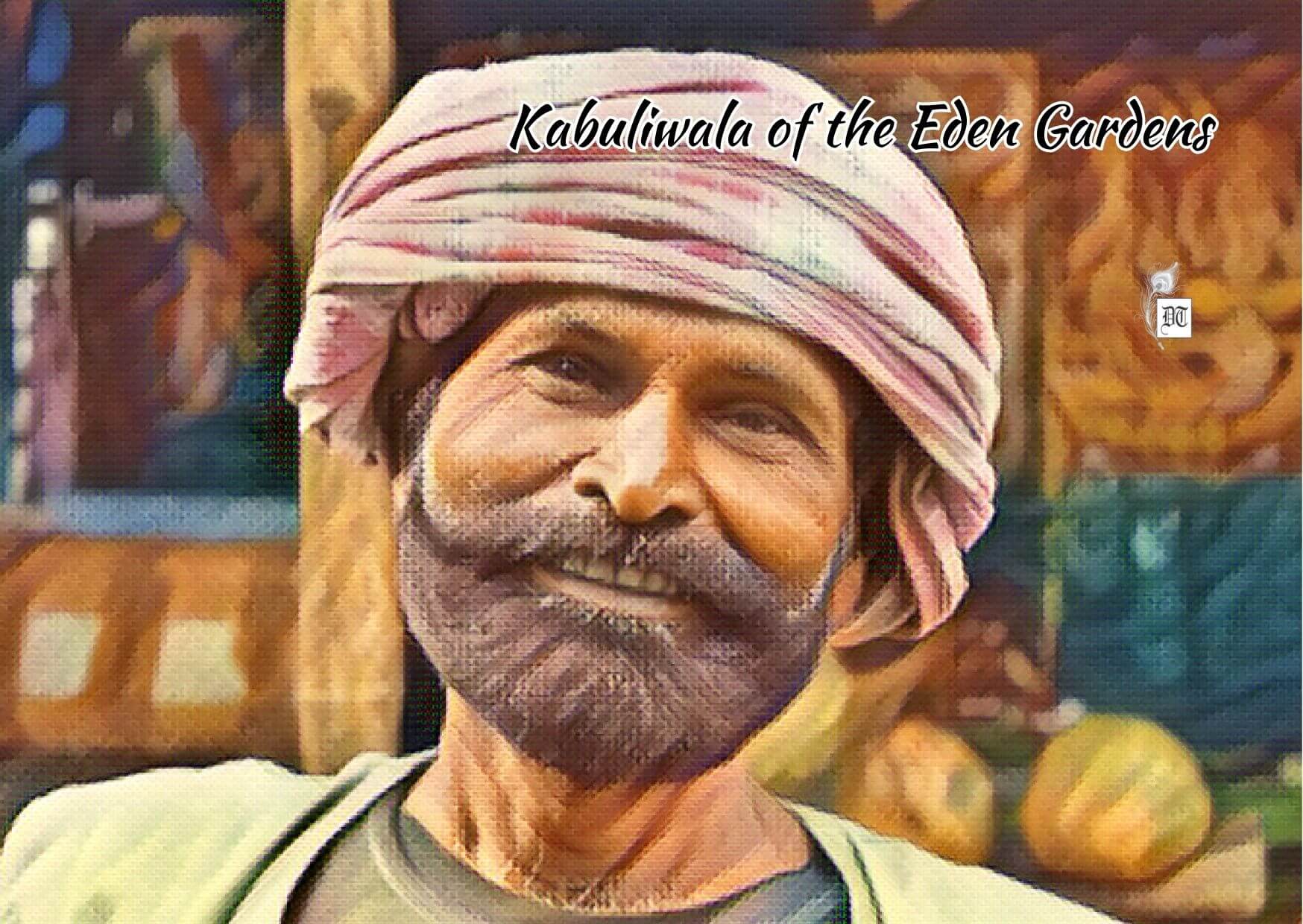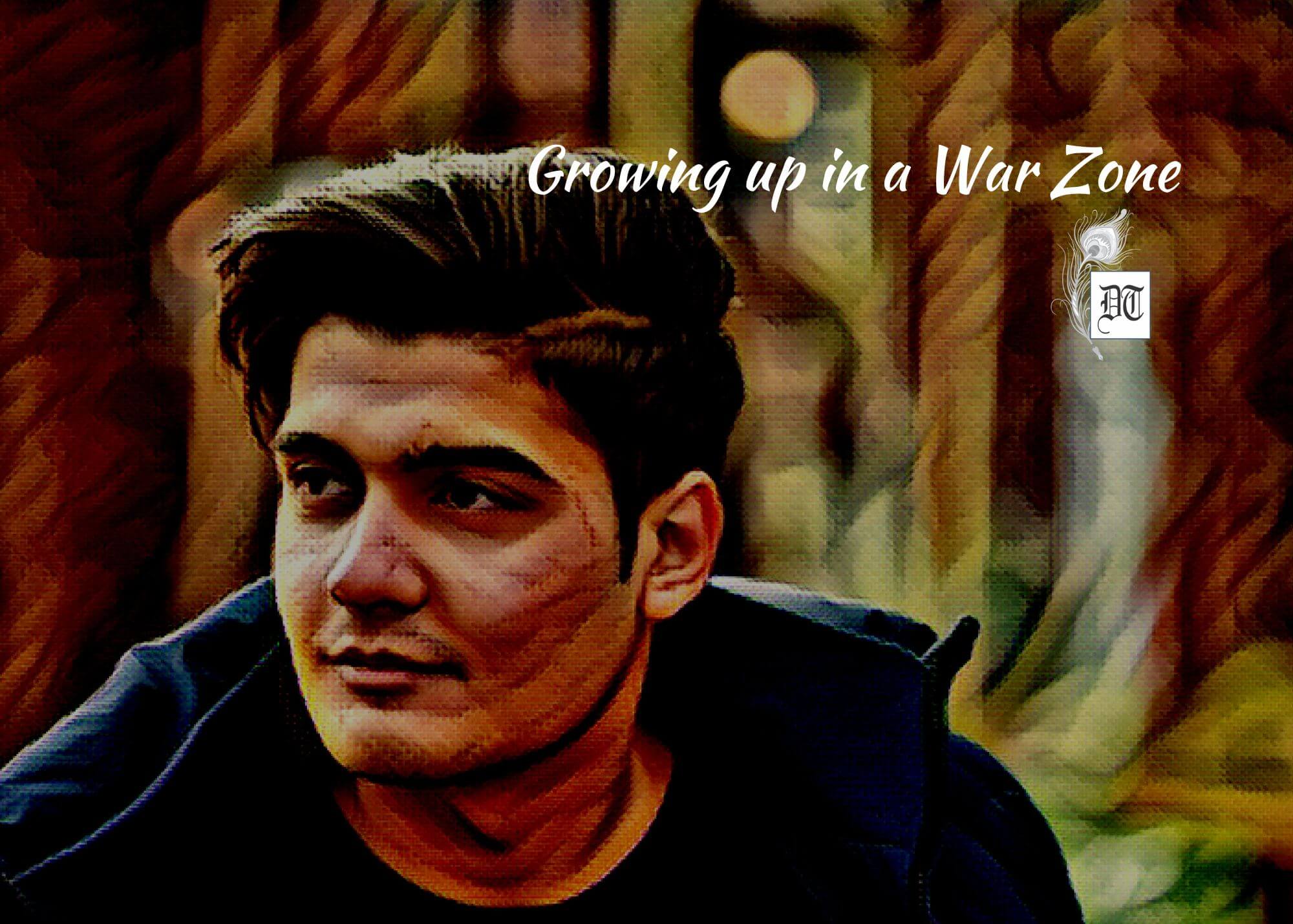As an homage to Tagore, Atrayee writes a modern version of Kabuliwala. This Mini’s world is that of crayons, TV, Cricket matches, and more. But, the echoes of the well-known story is distinct. Here’s a short story, as Special Feature, exclusively for Different Truths.
Mini was angry. Nobody had time for her. She manically smeared the whole red crayon on her parrot drawing, thereby imparting a peculiar tint. Green body, red beak; and the head? Virtually brown, through the melange of art and anger of this five-year-old.
‘What have you done Mini?’ Manju sighed as she stole a glance at Mini’s drawing book. ‘Don’t you know how a parrot looks like?’
‘I know.’ Mini retorted while arranging her crayons in the box. The bubble of her anger was about to burst.
Manju smirked for she understood Mini’s yearn for attention. And before she could console Mini, she was whipped with some innocuous queries.
“Do you know Ma? Watching TV in the evening is not good for the eyes.” Mini eyeballed her father Rupendra, who was blissfully unaware of the simmering heat in the air. ‘Hmm! There are so many things to do Ma…. But, people only watch cricket.’ She wrapped up her drawing session humming a recently learned rhyme and sat on the sofa adjacent to Rupendra.
“Ma. Oh, Ma.” Mini deliberately raised her voice. “Does Baba know how to read stories? I don’t think so.”
His little darling was trading disgust for a promise unfulfilled by him.
Rupendra realised his daughter’s naïve sarcasm. His little darling was trading disgust for a promise unfulfilled by him.
A week ago, on Mini’s fifth birthday, a collection of Tagore’s short stories came as a gift. And, Rupendra had promised Mini to read them out during her vacations. Three days had passed, and Rupendra couldn’t read out a single word to Mini. Quite a tough job being a cricket ground curator, that too during the Indian Premier League. That year, two new teams were announced, a banned team was resurrected, oldies reshuffled, new faces were brought in, and most importantly, matches at the Eden Gardens had the shortest turn-around times leaving Rupendra with too much on his plate. Fulfilling Mini’s promise seemed far-fetched.
Mini was a bundle of energy. She derived pleasure in running around the bushes, teaching rhymes to her pug, talking to anybody and everybody, unhindered, unashamed, and listening to their servant Bhola’s narration about his village and then, sewing several amusing queries to her parents. In a nutshell, Mini was a chatter-box who probably talked even during her sleep. While her peers preferred YouTube or mimicking the TV serial fashionistas, Mini drew comfort from life itself.
“Mini!” Manju called out from the kitchen. “Are you supposed to talk like this to Baba?”
Mini quietened but her cute face betrayed her pangs as she glanced at her father. Rupendra switched off the TV and cupped her face with affection. The suppressed tears flowed freely but she remained quiet.
“I am sorry Mini.” Rupendra made her sit on his lap. “You know how much I have been busy.”
“Today you are free, no?” Mini furled up her eyebrows and asked. “Then why can’t you read me one?”
Rupendra was exhausted physically and badly in need of sleep. Nevertheless, how could he deny those teary eyes, which had been surprisingly patient for the past three days? He closed his eyes.
A few hushed moments later, she approached her father with a fresh dose of persuasion. “You know Baba, even Bhola knows Tagore stories. He told me. Someplace…SHAANTI…TIKENAN. Tagore dadu lived there.”
Rupendra, eyes still closed, laughed at Mini’s confused, but confirmed proclamations. “It is Santiniketan. Not tikenan, Mini.”
“Ohhh! I never read about it, no.”
Such a protracted response was actually a demand in disguise. Rupendra surmised that concealed his impending yawn, opened his eyes and asked, “Which story?”
Within the bat of an eyelid, Mini dashed to the adjacent table, pounced on the top-most book and opened it.
“K-A-B-U-LIWALA.” Mini read out loud. And her eyes! They beamed with a myriad of emotions. The storytelling session was interspersed with many an interrogative intrusion here and there. Like, where is Kabul? Did Mini resemble her namesake from Tagore’s story? Why was Bhola present in the story as well? And many more. Rupendra’s fabricated replies pulled Mini into a stupor and she soon traded with her dreams.
Next day, Rupendra was besieged by Mini to finish the remainder of the story. The weary Rupendra though dug up an escape route. How? Through a cricketer. The Mumbai team had bought during that year’s auctions, a new fast bowler from Kabul, a true blood Pashtun. Rehamat Mujibur Khan. Conveniently, there was a match being aired on TV where Rehamat was bowling.
“Mini, do you want to see Kabuliwala?”
Mini was baffled and enthralled in tandem.
Mini was baffled and enthralled in tandem. How could Kabuliwala come into life from the book?
“Where?” She queried in disbelief.
Rupendra pointed out to the tall broad handsome man bowling the current over and declared him to be Kabuliwala.
“Kabuliwala plays cricket?” Mini, still mired in doubt, ran her fingers on those puzzling printed words. “Where is it written? Kabuliwala sold dates and raisins only, no.” Mini ogled at the TV screen. Rehamat was conversing with his captain. Mini analysed him thoroughly and declared. “He doesn’t have a jhola…He is not Kabuliwala.”
Rupendra laughed at Mini’s astute observations and said, “Kabuliwala need not have a jhola always…Anyone from Kabul is Kabuliwala.”
With a perfunctory approval, Mini’s thoughts jumped onto a different terrain altogether. “So you know Kabuliwala is it, Baba?” A frisson of thrill ran down her spine as she was eager to know more about Kabuliwala.
“Shall we meet him tomorrow?”
“Oh yes.” Mini reclined on the sofa conceiving what all she could talk to this cricketer Kabuliwala. Her innocuous sentience presumed him as a distant relative of Tagore dadu’s Kabuliwala.
Mumbai was playing against Kolkata for the finals three days later. During the practice session in the morning, Rupendra picked his chance to request Rehamat. Mini had been to the ground before. Blissfully ignorant towards cricket, she was busy counting the number of seats when Rupendra came to take her to the ground.
The handsome Pashtun, drenched in humility and grace, stood there with a bright smile. Rehamat bent down and greeted Mini like a queen by placing a peck on her hand. Unversed with such greetings, Mini hid behind Rupendra. She was shy, not knowing what to talk. However, Rehamat was informed beforehand by Rupendra about his little admirer.
“I too have a jhola and dates.” Rehamat kneeled down and peered into Mini’s eyes.
Mini clamped her eyes tight in embarrassment, hugged her father tight and said. “No, you don’t…Not all Kabuliwalas have. I know.” Mini’s unstained objection provided much mirth to Rehamat.
In a few minutes, when Rehamat started talking about his daughter and Kabulis, Mini felt comforted and was listening keenly. Given a chance Mini could have narrated her autobiography of five years, but the time constraint meant that her rendezvous with Kabuliwala lasted for only twenty minutes or so. Mini gifted a crayon painting to Rehamat with something scribbled at the bottom; supposedly, her autograph.
In the finals, Mumbai lost with a leery twist. Rehamat, the wonder bowler had leaked runs to the opponents like water. Top it all, his poor fielding added flavour to the bubbling pot. Rehamat was criticised openly, blatantly. Upset he was; nevertheless, the little time that he had spent with Mini lent some solace. Before leaving, Rehamat gave a packet of dates to Rupendra and a pair of earrings for Mini, which he had originally bought for his daughter, Razia.
Rehamat’s sudden deterioration of form polarised the cricket fraternity. Whispers of match-fixing turned into a clarion call for further probing. A few other prominent names were being linked to the brouhaha. Videos of post-match parties showed the presence of notorious bookies. Media, press, and everyone arraigned the credibility of the game and the players. Cricketers were decried for playing with the Indian public’s emotions. Spy cameras released many incredulous pictures of Rehamat and a few of his peers spending quality time with a well-known bookie called Vindu. Right-wing radical groups protested the inclusion of Non-Indians in an Indian League and went to the extent of denigrating them as a threat to Indian culture. The outrage was unruly and the public sentiment restive; it compelled to be stopped. Ensuring the need of the time, Vindu was taken into custody for further inquiry.
The court found Rehamat guilty and decided to release the verdict after lunch.
The legal process started. Vindu accused Rehamat of encashing personal benefits, all the while surreptitiously caching the big-wigs associated with the scandal. Rehamat denied any tryst in such misdeeds. But the arm-twisted witnesses spoke otherwise. Innately hot-tempered Rehamat hindered the court proceedings with repeated life threats to Vindu. The court found Rehamat guilty and decided to release the verdict after lunch.
Outside the courtroom, Vindu constantly mocked Rehamat about the incompetence of the legal system and his unending influence on the case. That served as the fatal spark to the powder keg. Rehamat lost his sanity and grabbed Vindu by his throat. So hard, that Vindu, an asthma patient, lost his breath before anybody could rescue him. Hundreds of onlookers stood as an eye-witness against Rehamat and the court wasted no time in sentencing him to life imprisonment.
Oblivious to these episodes, Mini knitted stories of her cricketer Kabuliwala to Bhola and her friends. The next IPL season, Mini waited for Rehamat to come at Eden Gardens but Rupendra served her with palatable reasons for Rehamat’s absence. And over the time, memories of Kabuliwala faded away from Mini’s mind.
Rehamat, on the other hand, left no stone unturned in seeking help from his embassy, to serve out the punishment in Kabul. But, the political circles of Afghanistan wished to abide by the Indian sentiments and did not want antagonism. Thus Rehamat remained in India, imprisoned, away from his family, his daughter. Far afield of affluence, Rehamat’s family could never pay a visit to him in the jail.
Fifteen years later, Rehamat was freed on the grounds of good behaviour. He was stunned by the altered façade of India. The country had changed so much. So would have Kabul, he wondered. His brothers came to take him back and there stood a young woman whom Rehamat couldn’t recognise. He cleaned his spectacles and looked again. The girl was smiling at him.
‘Razia?’
Finally, happiness stroked him back. Rehamat couldn’t stop admiring his grown-up daughter. And suddenly, while talking to her, his memories turned to that child he met at Eden Gardens. What was her name? Mini. She would have grown too.
Rehamat wished to see Mini before bidding adieu to India; the only beautiful memory India had gifted him.
Razia contacted the present officials at the Eden Gardens and found out Rupendra’s whereabouts. Rupendra was surprised to know of Rehamat’s wish. A fraidy-cat by nature, Rupendra never mustered the courage to reveal the truth about Rehamat to Mini. Perhaps, this routine preserved the innocence of Mini from the cruel complexities of life.
Rupendra was never in touch with Rehamat all this while. He wondered how the cricketer Kabuliwala would look now. And there he stood at his threshold with the same humility and grace of a Pashtun.
Rehamat had aged, more emotionally than physically. Still, he was handsome. His stature bore the blemishes of his trauma, the scar of being called a traitor; and those naturally kohled eyes, they bore a pain; irrevocable, incurable. Rehamat just had one wish; to meet Mini.
But where was she? Neither hiding behind her father nor shying away from her Kabuliwala?
Rupendra called out for Mini and there she came too; swiping on her phone utterly engrossed in her own world reluctant to even look at her guest. Rupendra recollected the memories, however, Mini failed to remember anything about Rehamat. Seeing that muddled mien, Rehamat showed her that crayon painting, which he had preserved till date. Still, all efforts went in vain. Mini laughed at that terrible piece of art. That’s it. Nothing more, nothing less. Mini had grown up; so much that even Tagore’s Kabuliwala was insolently removed from her thoughts. Leave alone the Eden Gardens’ one.
Woebegone, Rehamat had to return to his country, to his estranged family; unbeknownst to the degree of animosity that would have brewed over there.
“Sorry! I don’t have any dates or raisins.” Rehamat smiled with his hands folded and made a move to the doors.
Rehamat was surprised, for the earrings were the same which Rehamat gifted to Mini.
Rupendra hugged him tightly. His eyes moist. “But, this father has something to give today.” Rupendra sniffed and placed something on Rehamat’s hand. A pair of earring. Rehamat was surprised, for the earrings were the same which Rehamat gifted to Mini.
“You still have this?” Rehamat asked.
“Much like that crayon painting, I preserved this as a keepsake of a father, lamenting for his daughter in a faraway land.”
Rehamat had nothing to offer, except tears. He wept and wept and wept. The abandoned soul flushed out every ounce of angst that he had accrued till date.
Nobody knew if Rehamat ever came back to India. Neither had he kept any touch with Rupendra. Nevertheless, Rupendra often brooded over his Kabuliwala of the Eden Gardens; a literal reincarnation of Tagore’s creation.
Picture design, Anumita Roy, Different Truths
#Kabuliwala #Rehamat #RabindranthTagore #ShortStoriesOfRabindranath #RabindranathTagore #Mini #SpecialFeature #CreationOfTagore #TributeToTagore #DifferentTruths









 By
By
 By
By
Beautiful interweaving of the narrative of Eden Garden ‘s Mini and that ofTagore’s Mini👍